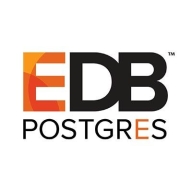

MongoDB and EDB Postgres Advanced Server are leading database solutions competing in the database market for handling complex applications and large data volumes. MongoDB holds an advantage with its flexibility and developer-friendly capabilities, while EDB Postgres offers robust enterprise-level features.
Features: MongoDB is designed for handling large volumes of unstructured data, offering JSON compatibility and powerful aggregation features that support scalability in various applications. It provides a flexible, open-source environment well-suited for dynamic application development. EDB Postgres Advanced Server caters to enterprise needs with features akin to those of Oracle. Its traditional relational database structure, comprehensive documentation, and high availability make it valuable for enterprise-grade applications requiring robust architecture and integration capabilities.
Room for Improvement: MongoDB users suggest enhancements in security features and documentation. Improvements in BI tool integration and transaction capabilities are also desired. EDB Postgres Advanced Server requires better JSONB querying and improvements in scalability for large-scale operations. Users also express the need for better support in mobile application contexts and AI feature support.
Ease of Deployment and Customer Service: MongoDB offers versatile deployment options suitable for public, private, and hybrid clouds, with its community edition recognized for scalability. However, enterprise-level support incurs additional costs, with a stronger reliance on community support. EDB Postgres Advanced Server supports both on-premises and cloud deployments, leaning more towards enterprise functionalities. It provides structured and higher-level technical support, offering more formalized assistance compared to MongoDB.
Pricing and ROI: MongoDB is an open-source solution that becomes cost-effective when using its community edition, while the enterprise edition incurs a fee but remains cheaper than some competitors like Oracle. Users report satisfying ROI driven by performance and scalable benefits. EDB Postgres Advanced Server maintains competitive pricing, particularly favorable for smaller enterprises, but the costs may increase with large-scale implementations. Though both options include free versions, MongoDB's enterprise costs can be higher, with negotiations often required based on the deployment scale. Both solutions offer meaningful ROI through performance and enterprise-grade features.


EDB Postgres Advanced Server is a powerful and reliable database management system designed for production workloads. It offers a range of advanced features, making it an ideal choice for businesses looking to scale their operations. With support for multi-tenancy, JSONB, and production features similar to Oracle, the solution is versatile and can meet the needs of a wide range of organizations.
Overall, EDB Postgres Advanced Server is a robust and flexible database management system that can help businesses achieve their goals and stay competitive in today's fast-paced digital landscape.
MongoDB is a flexible and scalable NoSQL database solution that efficiently handles both structured and unstructured data. It is known for its ease of use, JSON capabilities, and efficient data handling, making it ideal for developer-friendly environments.
MongoDB stands out with features like sharding, geospatial indexing, and its open-source nature. Users find it fast and appreciate its seamless integration into different applications. Despite being powerful, it remains straightforward to set up and use, bolstered by a clustering and aggregation framework that enhances its functionality. While generally appreciated for its cost-effectiveness and broad application compatibility, there is room for improvement in security, enterprise integration, and the creation of more robust training and documentation resources. Enhancing performance and adding support for traditional relational database concepts could also prove beneficial.
What are MongoDB's most important features?MongoDB finds widespread application across industries like healthcare, logistics, and telecommunications. It efficiently powers IoT platforms, data analytics, and document management systems. Its schema flexibility and JSON storage capabilities make it ideal for real-time processing and multi-server databases, essential for handling large-scale data volumes in modern applications.
We monitor all Open Source Databases reviews to prevent fraudulent reviews and keep review quality high. We do not post reviews by company employees or direct competitors. We validate each review for authenticity via cross-reference with LinkedIn, and personal follow-up with the reviewer when necessary.